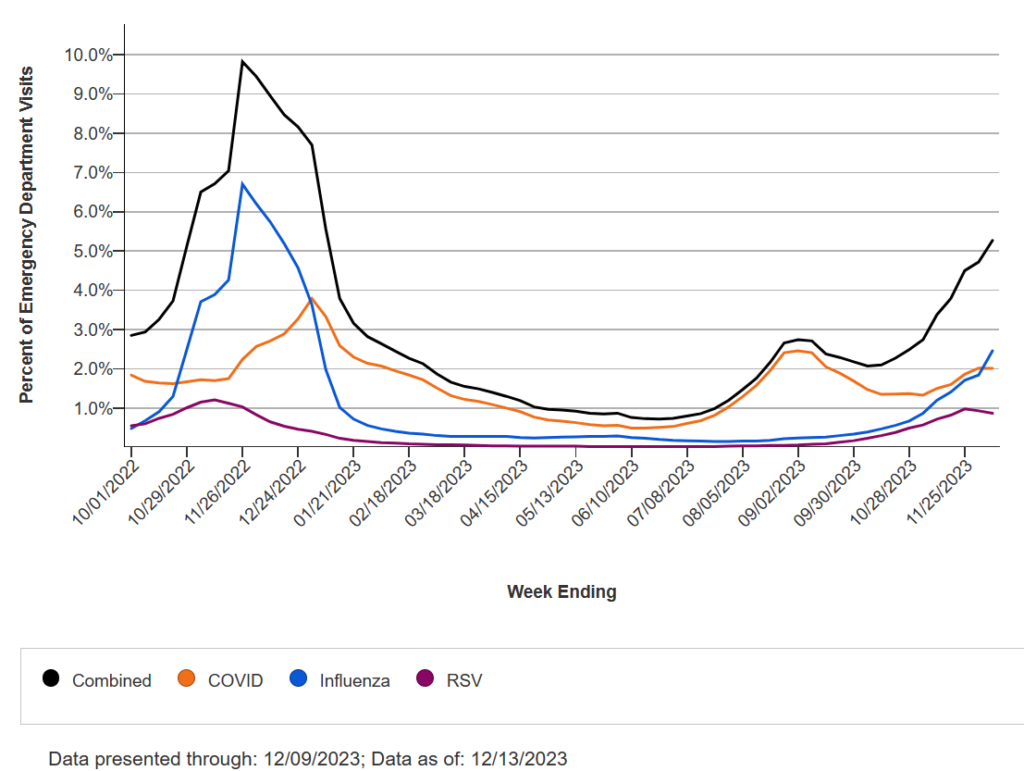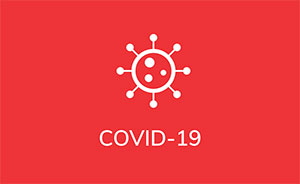With the holidays fast approaching, those living with CLL / SLL especially need to remember ways to decrease the chance of catching one of the many viruses that are rapidly spreading this time of year. Per the CDC’s respiratory virus dashboard, emergency room visits are on the rise for RSV, COVID-19, and influenza right now. In the past 4 weeks, hospitalizations among all age groups increased by 200% for influenza, 51% for COVID-19, and 60% for RSV.

And according to a CDC Alert issued to healthcare providers on December 14th, low vaccination rates, coupled with ongoing increases in national respiratory disease activity caused by influenza, COVID-19, and RSV could lead to more severe presentations of the disease and result in a serious strain on the healthcare system in the coming weeks.
Why Do Those with CLL / SLL Still Need to Take Additional Infection Control Precautions?
Everyone diagnosed with CLL / SLL is considered moderately to severely immunocompromised, even if you are not currently undergoing treatment. This is because CLL / SLL is a cancer of the immune system, more specifically the B cells which are one of the ways our bodies fight off infections. These cancerous B cells become dysfunctional, impairing the body’s ability to mount a strong response to invaders. There is currently no test available to measure just how immunocompromised you are. You can read more in an article CLL Society posted, “What it Means to be Immunocompromised for Those with CLL / SLL.”
There are data indicating the risk of infection increases with higher RAI staging of the disease and when taking certain treatments for CLL. Anti-CD20 monoclonal antibodies (like rituximab and obinutuzumab) are commonly used therapies which target the CD20 protein that is expressed on the surface of all B cells. So, while they help eliminate many malignant B cells, they also further impair antibody production because they deplete the total number of B cells available to help fight off infection. Therapies like this are appropriate for treating B cell cancers, but they reduce the body’s ability to make antibodies, respond to vaccinations, and fight off infections.
What Can Be Done This Holiday Season to Help Lower the Risk of Infection?
Unfortunately, there is no one single fool-proof way to avoid infection (besides avoiding people all together which is not at all recommended). It is important for mental health to be able to socialize with others and continue to enjoy the things that bring us happiness. However, the ways in going about those activities may need to look slightly different in order to reduce potential physical harm due to being immunocompromised. Many of the tips written in an interview with CURE Magazine last year, “How to Avoid Bringing COVID-19 Home for the Holidays” still hold true and apply to other respiratory infections like RSV and influenza as well.
Those with CLL / SLL should consider the following measures:
- In consultation with your healthcare provider, make sure you are up to date with the most recent version of the COVID-19 vaccine, that you have received your annual influenza vaccine, and potentially RSV vaccine (if you qualify).
- Always wear a well-fitted, high-quality KN95 or N95 mask when in enclosed spaces with others.
- Continue to practice good hand washing.
- Consider ways in which you can increase ventilation, such as cracking open windows or doors, purchasing high-quality air purifiers with HEPA filters (as HEPA filters can reduce the amount of viruses in the air), changing the HVAC filter in your home just prior to the gathering. Turning the HVAC fan to on (instead of auto) will keep the air moving and continuously filtering through the home’s HVAC system.
- Request the people you are gathering with to not attend if they have any cold or flu symptoms or have had recent exposure to anyone who has symptoms.
- If the people you are gathering with are open to it, request that they isolate for a couple days prior to the gathering and/or wear a mask when in contact with others.
Additional measures might include:
- Let your hosts or guests know you plan on masking to keep the event safer. This can help to normalize the conversation.
- If your friends and family are open to it, suggest taking a rapid COVID-19 test the day of the gathering. Although rapid tests are not perfect, they are still a tool that can be used.
- If weather allows, consider eating outdoors. If you are in a situation where you are the only one masking, consider eating prior to attending or eating in another room that hasn’t been occupied where you can close the door and rejoin the group after you are done eating and can mask again.
- There are data to suggest using a mouthwash that has cetylpyridinium chloride (CPC) in it can help to decrease COVID-19 infectivity. This should not be used as a substitute for masking, but it can be another good layer of protection to consider.
Ultimately, we all have to make personal health decisions that we believe are best for us after performing an individualized risk assessment. You are the authority on your personal health and how you choose to protect it. Please remember, you are worthy of being in spaces where people care for you and respect the infection control safety measures that are necessary for you to feel safe. It’s okay to decline an invitation to a get together if you need to (and want to). It is also important to remember that in a world that has seemingly moved on as if a deadly virus is no longer in existence at pandemic levels (even though it technically still is) you are not weird, anxious, or paranoid for being well-informed and continuing to take control of your own personal health.
I would like to wish everyone a wonderful holiday season!
Keep learning, and please stay safe.
Robyn Brumble, MSN, RN



